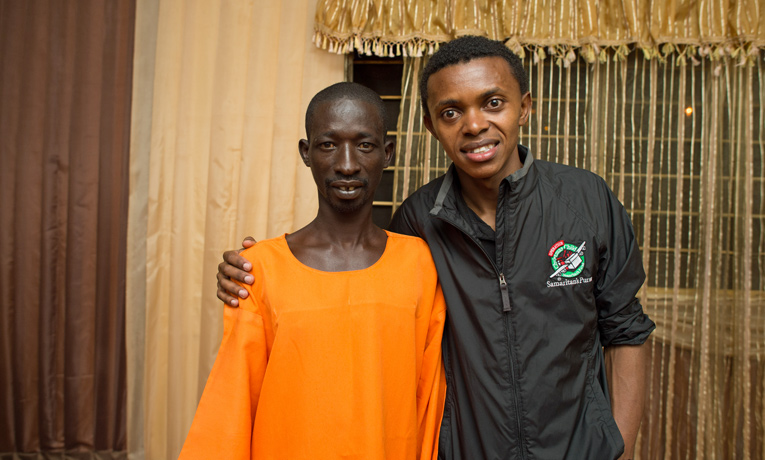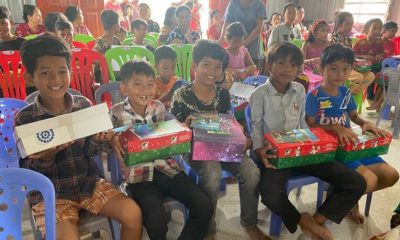After the Rwandan Genocide, Alex Nsengimana became a Christian. Since then, his goal has been to meet the man who killed his uncle and offer him forgiveness face-to-face.
By Kim Rowland, a staff writer who traveled to Rwanda with 24-year-old Alex Nsengimana to deliver Operation Christmas Child shoebox gifts at the orphanage where he spent part of his childhood. While there, they visited a prison so that Alex could offer forgiveness to the man who killed his uncle.
My heart was strangely calm, although my thoughts were racing faster than a thoroughbred, as I sat in a sparsely decorated room in a Rwandan prison waiting to meet a murderer. In the light of a dimly flickering fluorescent bulb, I imagined a gigantic, hulking man stepping through the double doors behind me.
“He’ll most likely glare at all of us,” I thought, glancing around at the mixture of black and white faces that waited in anticipation.
A dark storm cloud brought torrents of rain and gusting wind that blew fat water droplets through the loosely sealed glass slats of the barred windows. It passed quickly, and the sun sank majestically below one of Rwanda’s thousand hills.
Suddenly, the doors burst open and a man not much taller than 5’ 3” and barely 100 pounds walked through.
“He has agreed to meet us, but don’t ask me any questions yet,” 24-year-old Alex Nsengimana said as he rejoined the group.
We all breathed a sigh of relief. We had been waiting all afternoon, in various locations around Kigali, for the chance to meet the man who killed Alex’s uncle during the Rwandan genocide nearly 19 years ago. Moments later, two men entered the room—one man large and muscular as I had imagined and the other impossibly small, smaller even than Alex.
I was shocked when the small man was the one to step forward, his eyes shifting nervously toward the floor, to shake Alex’s hand. This was the man who had brutally beaten and killed a member of Alex’s family? This man, who in his early 40s, was shorter and skinnier than my Rwandan friend.
As he shuffled closer, toward a chair at the front of the room, his electric orange shorts draped far below his knees, I felt my body tense.
“How can this man have killed anyone, much less a man he used to know and socialize with?” I wondered. Alex’s uncle at one time had called the prisoner his friend. I didn’t have much time to reflect, as Alex sat down next to the man, Niyoneza Rwagakinga, and began to speak.
“My name is Alex Nsengimana,” he said in Kinyarwanda, his native tongue. “My uncle was Karara. Could you tell me where you were when Karara died?”
The prisoner’s hand reached up, his bony arm swimming in the short-sleeves that extended far below his elbows, and grabbed a red-and-white-checkered satin cap off his head. He began to speak, acknowledging that he remembered Karara from that fateful spring morning.
“It was around 9 a.m.,” he said. “There was a militia group looking for someone called Karara. I went with them. When we got to the house [we] took Karara out of the house where he was hiding and shot him. After we killed him, we just left him lying in the yard.”
The Power of God
I sat in stunned silence, unable to see Alex’s reaction to this blunt description of the murder of the man whom he regarded as a father. Alex took a deep breath and began again.
“The reason I’m here is not to accuse you. Yes, you committed crimes, but I’m not here to accuse you,” Alex said, the next words catching in his throat as he began to cry. “I am here because I’ve seen how the power of God works in forgiveness. I want that same power that I have seen to be with you. Know that I have no bitterness toward you. I want you to have and live in that peace that I have found. You may or may not have repented of what you did, but I want to let you know that God loves you and he created you in His own image. In your life, wherever you go, always remember that Jesus loves you.”
I strained to hear the whispered translation. The prisoner had agreed to meet Alex and the media crew from the U.S., but he had not agreed to let us film the encounter, leaving me—the writer—as the sole documenter of the monumental event.
I glanced furtively around to see tears running down most of the faces in the room. Concentrating hard on holding my own back, I blinked furiously so the words on my tiny bits of paper would not dissolve into a watery blur.
What happened next is forever etched into my memory. I have never felt the grace of God so tangibly as in that room, when Alex knelt side-by-side with the very man who brutally beat and murdered his uncle and placed his hand on the prisoner’s back.
Alex began to stutter out a prayer, overcome by a storm of emotion.
“Father God, we thank you for your love. You are a great God. You are a forgiving God. I pray that you may forgive Rwagakinga and free him from all the crimes he has done, for we all have sinned. I pray that you may continue to protect him and remind him that you love him and have created him in your own image. I pray that you may bless him and give him peace. If he doesn’t know you, Father, may he come to know who you are. You are a great God, and may all honor be to you. Forgive him, just as you forgave my sins. Father, I forgive him in front of these witnesses, so he can have the peace that he needs. We give glory to you, our God.”
“I Do Not Have Bitterness Toward You”
The pair stood, and a circle of Alex’s friends swooped in around them.
“Please send a message to the rest of your family asking them to also forgive me for what I did,” the prisoner said.
He mentioned neighboring families, asking Alex to bring them to the prison so he could ask forgiveness. He began to cry, as he confessed that in one family, he killed all except one person.
“I don’t know what came over us,” he said. “We killed everybody. Please forgive us. When I think of what I did, I always get sick. Some I don’t remember, but I did kill many people.”
He stepped back and began to shake other people’s hands. I backed away, and a thought raced through my mind. I immediately felt ashamed as I realized what it was. “I don’t know if I can shake the hand of someone who murdered another person.”
I, who had never been harmed by this man, did not want to shake his hand. I was even nervous about making eye contact with him. Yet Alex, who witnessed him kill a close family member, not only shook the prisoner’s hand, but he embraced him and prayed for him!
I shoved my shame out of my mind as Alex spoke again.
“What I want you to take from what happened today is that whatever you did, always remember that I do not have bitterness toward you,” he said.
After more prayers, we shuffled slowly out to our bus, still stunned and greatly humbled by what we had just witnessed. Alex, though, seemed to have a spring in his step.
I expected an emotional week in Rwanda, as we planned to visit genocide memorials and distribute shoebox gifts at the orphanage where Alex spent some of his childhood. But I never expected to learn the true meaning of forgiveness from a young man who has experienced so much and then to be humbled by his example.
“I feel like a great burden has been lifted off of my chest,” Alex said. “The moment I gave my life to Christ, it became my dream, to meet him face-to-face and forgive him.”






